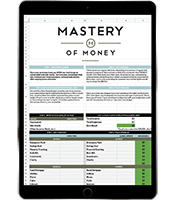In the pursuit of the Mastery of Money, It’s important to know that financial worries and financial struggle are not the same thing. One is simply fear and the other is situational.
There’s a couple that have been incredible friends of ours for nearly a decade. Over dinner recently we got to talking about fears, worries and concerns. The top of the list was, of course, making sure our children did well in school, had friends, were emotionally and physically healthy, and that we could afford the costs of college.
We also talked about crazy worries and fears that have been a part of our genetic makeup since birth. Things that were more than likely influenced by our parents, friends, and environment since the time we were little. They’ve remained internal to us, often rearing their ugly heads when we least want them to. And, as you might imagine, it was our spouses who revealed what those hidden worries were.
The wife of our friend revealed that her husband was constantly worried about money. He insisted that appliances be unplugged at home when not in use, he was constantly adjusting the thermostat down in cold weather and up in warm weather, he was religious about using coupons, and he balked at even some of the slightest expenses. While all of these behaviors no doubt contributed to their overall financial position (they both have good jobs, drive used cars, live in a modest home with a fair amount of equity, have 401k accounts, etc.), he had this nagging worry that they wouldn’t have enough money. And his worry manifested itself into somewhat rigid behaviors that caused challenges for everyone else in the house.
When we started describing our childhood upbringing, his was marked by a couple of significant job losses for his parents. He told us about a time when his dad had been looking for a job for nearly 2 months and the friction in the house was at an all-time high. He vividly described a fight between his mom and dad that ended up in his father storming out of the house in the middle of the night in a downpour. When I asked him what he thought it was about he said very plainly — money.
I have these kind of conversations often, and one of the key similarities in all of them is the meaning that was given to the event is generally from the perspective of that person as a child or teen. Not as an adult who has experienced adult type situations. The meaning stays the same throughout the person’s life, until and unless they redefine what the fight or memory actually meant.
By challenging him to put himself in their shoes at that time and that age BUT WITH his perspective as an adult, a curious thing happened. He talked about his brother being especially challenging as a kid, that his dad was stressed about finding work and wasn’t helping as much as his mom wanted during the day, that there was probably some bitterness and guilt that his dad was feeling. When we started to really pull back the onion, it was pretty apparent that he was beginning to put a different meaning on the fight. When asked how his dad storming out made him feel, he told us, “scared that something would happen to him.”
When we diverted the conversation back to why we make the decisions we make around money, he started to make the connection that the fear he felt in that instant when his dad stormed out was what he was trying to avoid.
This is not a family that experiences financial struggle. They’re making sound decisions around their spending, they live on less than they make, and there’s an emergency fund. What they are experiencing is financial worry caused by past memories that drive their current emotional state.
If you’re someone (or married to someone) that experiences financial worry, there are a few things you can do to help remedy the situation.
- Identify what their greatest fear actually is when it comes to money. All too often, a person that experiences financial worry HAS for the majority of their life because they grew up in a household that always had it. They don’t know any different and probably can’t pinpoint exactly what’s making them feel this way. They just believe it’s normal to feel this way.
- Come up with a number to have in savings that makes them feel safe and secure. Yes, there will be times that you’ll probably have to dip into this account, but that’s what it’s there for. My wife’s number was $20,000 for the longest time and I thought it was an insane amount of money to have in liquid reserves, but it made her feel safe and secure. (We’ve since lowered that amount considerably!)
- Paint a worst case scenario picture together. In painting this picture, make sure that you do so with a realistic situation in mind. You don’t both lose your jobs at the same time as a catastrophic health issue and an asteroid headed towards the planet. One of you loses your job and it’s 90-120 days later, what changes have you made? That’s the kind of realistic worst case situation.
- Ask yourself (or your partner) what thoughts lead to the feelings of worry. Thoughts trigger pictures which trigger emotions. Perhaps the thought of a lack of money is triggering that image of your dad leaving in a rainstorm and that’s why you’re feeling the way you do.
- Reassure yourself (or your partner) by reviewing your financial goals, your net worth, and at the very least a plan for the future. Being very future oriented is key to putting the money away to make yourself feel safe and secure. Do your utmost to remind yourself that you’re on the right path, that worry is normal but only if struggle is close behind, and that YOU are in control of both your money and how you feel about it.




